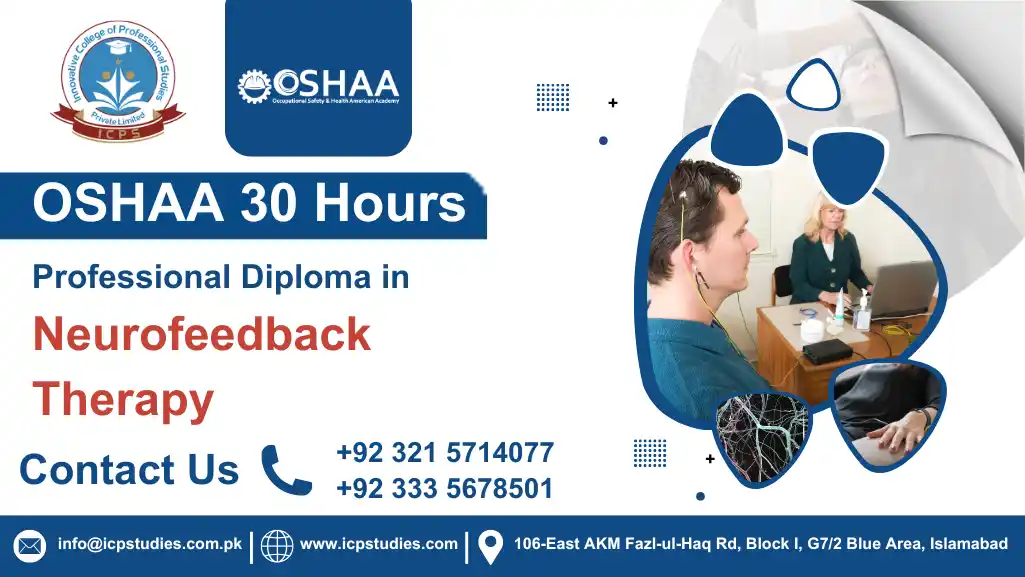The OSHAA 30-Hours Professional Diploma in Neurofeedback Therapy offers a comprehensive training programme for professionals looking to enhance their therapeutic toolkit through the use of cutting-edge neurotechnology. Designed with international best practices and clinical standards in mind, this diploma explores the foundational and practical aspects of neurofeedback, providing learners with the expertise to apply this technique in a clinical or therapeutic setting.
This specialised OSHAA 30-Hours Professional Diploma in Neurofeedback Therapy delves into brainwave activity, biofeedback mechanisms, and the application of neurofeedback in treating a wide range of psychological and neurological disorders such as ADHD, anxiety, depression, and sleep disorders. With a focus on real-world application, participants will learn how to assess patient needs, operate neurofeedback systems, and evaluate therapy outcomes effectively.
Through a blend of theoretical knowledge and practical demonstrations, learners will gain hands-on experience with neurofeedback equipment and protocols. Whether you are a mental health practitioner or a wellness specialist, this OSHAA 30-Hours Professional Diploma in Neurofeedback Therapy equips you with the tools to deliver data-driven, client-focused brain training interventions.
All About OSHAA 30-Hours Professional Diploma in Neurofeedback Therapy
Course Overview
The OSHAA 30-Hours Professional Diploma in Neurofeedback Therapy is a specialised training programme designed for professionals aiming to deepen their expertise in brain-based therapeutic practices. Neurofeedback, also known as EEG biofeedback, is a non-invasive technique that helps individuals regulate brain activity to improve mental performance and emotional regulation.
This OSHAA 30-Hours Professional Diploma in Neurofeedback Therapy provides an in-depth introduction to the science and application of neurofeedback within clinical and therapeutic environments. Participants will be introduced to core neurophysiological concepts, EEG brainwave analysis, and the use of neurofeedback equipment and software. The course combines theoretical instruction with practical exercises, preparing learners to assess, plan, and deliver neurofeedback sessions tailored to individual client needs.
Whether you are new to neurofeedback or looking to formalise your practice with a professional qualification, this OSHAA 30-Hours Professional Diploma in Neurofeedback Therapy equips you with the skills and knowledge required to practice safely and effectively.
Study Units
- Introduction to Neurofeedback Therapy: Principles and Applications
- Understanding Brainwaves and Their Role in Mental Health
- Neurofeedback Protocols and Techniques
- Setting Up and Using Neurofeedback Equipment
- Assessing Clients for Neurofeedback Therapy
- Applications of Neurofeedback in Mental Health Treatment
- Monitoring and Adjusting Neurofeedback Sessions
- Neurofeedback for Cognitive Enhancement and Peak Performance
- Advanced Techniques and Future Trends in Neurofeedback Therapy
To enrol in the OSHAA 30-Hours Professional Diploma in Neurofeedback Therapy, applicants must meet the following entry criteria:
Language Proficiency: Proficiency in English is required to understand course materials and engage in practical tasks
Minimum Age: Applicants must be at least 18 years old at the time of registration.
Educational Background: A minimum of secondary school completion or equivalent; preference may be given to candidates with background in psychology, healthcare, or allied health sciences.
Work Experience: Prior experience in a health, wellness, psychology, or education-related field is recommended but not mandatory.
The OSHAA 30-Hours Professional Diploma in Neurofeedback Therapy is suitable for a wide range of individuals seeking to enhance their professional qualifications or explore advanced therapeutic methods. Intended learners include:
- Mental health professionals seeking to integrate neurofeedback into therapeutic practice
- Psychologists and psychiatrists aiming to broaden their clinical intervention techniques
- Counsellors and psychotherapists looking to adopt neurobiological approaches
- Nurses and allied healthcare workers involved in cognitive rehabilitation or patient support
- Occupational therapists and rehabilitation specialists supporting neurodivergent individuals
- Educators and special education professionals managing behavioural and learning challenges
- Life coaches and wellness practitioners interested in neuroscience-based methods
- Individuals with a keen interest in neuroscience, brain health, or alternative therapies
Learning Outcomes
Introduction to Neurofeedback Therapy: Principles and Applications
- Demonstrate understanding of the theoretical foundations and clinical rationale of neurofeedback therapy
- Examine the historical development and evidence base of neurofeedback within mental health treatment
- Identify appropriate therapeutic contexts and client populations for neurofeedback interventions
Understanding Brainwaves and Their Role in Mental Health
- Analyse the characteristics and cognitive functions of key brainwave types (delta, theta, alpha, beta, gamma)
- Evaluate the impact of brainwave imbalances on psychological and behavioural disorders
- Interpret brainwave activity in relation to client symptoms and treatment planning
Neurofeedback Protocols and Techniques
- Identify common neurofeedback protocols and their applications for various clinical conditions
- Select and apply appropriate techniques based on individual EEG patterns and therapeutic goals
- Demonstrate clinical competence in executing protocol-driven neurofeedback sessions
Setting Up and Using Neurofeedback Equipment
- Operate neurofeedback systems including software, EEG devices, and monitoring tools
- Ensure accurate electrode placement and optimal signal acquisition
- Conduct routine maintenance and adhere to clinical safety procedures
Assessing Clients for Neurofeedback Therapy
- Perform comprehensive assessments incorporating psychological data and EEG results
- Determine client suitability for neurofeedback based on clinical evaluations
- Develop personalised treatment plans in line with identified neurological and behavioural needs
Applications of Neurofeedback in Mental Health Treatment
- Apply neurofeedback therapy in managing conditions such as ADHD, anxiety, depression, and PTSD
- Integrate neurofeedback into broader mental health treatment strategies
- Measure and evaluate therapeutic outcomes through both qualitative and quantitative data
Monitoring and Adjusting Neurofeedback Sessions
- Monitor client progress using session data and behavioural feedback
- Adjust neurofeedback protocols to enhance therapeutic effectiveness and accommodate individual responses
- Maintain clinical records and ensure compliance with ethical and regulatory standards
Neurofeedback for Cognitive Enhancement and Peak Performance
- Design neurofeedback sessions aimed at improving focus, memory, and mental clarity
- Apply performance optimisation protocols for individuals in high-demand roles (e.g., athletes, executives)
- Consider ethical implications of using neurofeedback for non-clinical cognitive enhancement
Advanced Techniques and Future Trends in Neurofeedback Therapy
- Identify professional development pathways and areas for advanced specialisation
- Explore innovations in neurofeedback including AI integration and real-time brain-computer interfaces
- Critically assess emerging research and technological advancements in the field
FAQs OSHAA 30-Hours Professional Diploma in Neurofeedback Therapy







